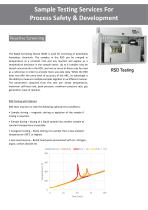
Catalog excerpts

Calorimetry solutions for Adiabatic, Screening or Reaction reactive chemicals and loss prevention Confidential service Comprehensive Rapid turnaround Test Reports
Open the catalog to page 1
Heat-Wait-Seek Test The world standard Accelerating Rate Calorimeter test to determine safety parameters of a chemical sample. The instrument increases the sample temperature in steps and checks for self-heating of the sample. When self-heating is detected the reaction is tracked adiabatically to completion. The ARC Heat-Wait-Seek test is an internationally recognized method of safety evaluation. The parameters obtained from this test are: Onset temperature, maximum self-heat rate, peak pressure, maximum pressure rate, gas generation, heat of reaction, activation energy, time to maximum...
Open the catalog to page 2
Sample Testing Services For Process Safety & Development Reactive Screening The Rapid Screening Device (RSD) is used for screening of potentially hazardous chemicals. The samples in the RSD can be ramped in temperature at a constant rate and any reaction will appear as a temperature deviation in the sample vessel. Up to 6 samples may be tested concurrently in the RSD, and one or more of these may be used as a reference in order to provide more accurate data. While the RSD does not offer the same level of accuracy of the ARC, its advantage is the ability to measure multiple samples together...
Open the catalog to page 3
Sample Testing Services For Process Safety & Development Reaction Calorimetry The THT Micro Reaction Calorimeter µRC has a wide range of chemical applications. Designed for maximum flexibility the instrument can operate in isothermal, scanning and titration modes. Power compensation technology makes the calorimeter faster in both signal response and temperature variation making ideal of kinetic studies. The µRC uses a maximum cell volume of 1.5ml and injection volume of up to 250µl ensuring the required volumes of reactants and wastes are kept small. The instrument also provides a quick,...
Open the catalog to page 4All Thermal Hazard Technology catalogs and technical brochures
-
RSD Rapid Screening Device
6 Pages
-
BPC ARC System
2 Pages







